Cortisol and Caffeine: How Much Is Too Much?
Introduction
For millions of people, the day doesn’t truly start until that first cup of coffee hits. ☕
The rich aroma, the warmth in your hands, the surge of energy — caffeine feels like life itself.
But behind that pleasant buzz, something deeper is happening in your body.
Caffeine doesn’t just wake you up — it triggers your cortisol, the body’s main stress hormone.
In moderation, this isn’t a problem. In fact, caffeine and cortisol can work together to boost focus, motivation, and alertness. But when overused — especially during times of stress, fatigue, or poor sleep — caffeine can overstimulate your adrenal system, pushing cortisol into chronic overdrive.
This article explores the delicate relationship between caffeine and cortisol, how much caffeine is “too much,” and how to enjoy your coffee (or tea) without wrecking your hormones. 🌸
Looking for supplements for This? Click here.
🌞 What Is Cortisol?
Cortisol is your body’s built-in energy regulator. Produced by the adrenal glands, it helps control metabolism, blood pressure, immune function, and stress response.
Under normal conditions, cortisol follows a daily rhythm:
High in the morning (to help you wake up)
Gradually decreases throughout the day
Lowest at night (to allow rest and repair)
Caffeine interacts with this natural rhythm. It can either enhance it — or completely disrupt it, depending on timing, dosage, and individual stress levels. 🌿
🌿 How Caffeine Affects Cortisol

Caffeine works primarily by blocking adenosine, a neurotransmitter that makes you feel sleepy. But it also triggers your adrenal glands to release adrenaline and cortisol — the same hormones your body produces during stress.
This is why caffeine can make you feel sharper, faster, and more alert.
But it’s also why too much caffeine can make you anxious, jittery, or drained later in the day.
Here’s what happens:
Caffeine blocks adenosine receptors, delaying fatigue.
The brain senses increased activity and signals the adrenal glands to produce more cortisol and adrenaline.
Cortisol spikes temporarily, giving you energy — but if repeated too often, it starts to dysregulate your natural rhythm.
That’s why caffeine feels amazing in the moment but sometimes leads to energy crashes or sleep disruption later. 🌸
🌞 Morning Cortisol and Coffee Timing
Your cortisol naturally peaks between 6–9 a.m. — part of your built-in “wake-up hormone” cycle.
If you drink coffee immediately upon waking, you’re doubling up on stimulation. Instead of letting your cortisol rise naturally, you force an extra spike — which can make your system dependent on caffeine to feel awake.
A better strategy:
☕ Delay your first cup by 60–90 minutes after waking.
This allows cortisol to do its job first, and caffeine then becomes a gentle boost instead of an artificial jolt. 🌿
🌿 Caffeine and the Stress Response
Caffeine and stress use the same physiological pathway — the HPA axis (hypothalamic-pituitary-adrenal system).
If you’re already under chronic stress, adding more caffeine is like pouring gasoline on a fire. It amplifies cortisol, keeping your body stuck in a “fight-or-flight” mode even when no real danger exists.
Symptoms of Cortisol + Caffeine Overload:
Afternoon energy crashes
Irritability or anxiety
Poor sleep quality
Sugar or carb cravings
Digestive upset
Heart palpitations or restlessness
“Tired but wired” feeling at night
If these sound familiar, it’s a sign your caffeine–cortisol relationship may need recalibration. 🌸
🌞 How Much Caffeine Is Too Much?
Caffeine sensitivity varies greatly between individuals based on genetics, liver metabolism, and stress levels.
General guideline:
Most adults can handle 200–400 mg of caffeine daily (about 1–3 standard cups of coffee).
Above 400 mg, the risk of cortisol disruption, anxiety, and insomnia increases.
But if you’re under chronic stress, have adrenal fatigue, or poor sleep, even 100 mg can cause noticeable cortisol spikes.
Here’s an approximate caffeine breakdown:
Espresso: 80 mg
Drip coffee (8 oz): 100–150 mg
Green tea: 30–50 mg
Matcha (1 tsp): ~70 mg
Energy drink (small): 100–160 mg
Remember — caffeine’s half-life is 5–6 hours, meaning half of it is still in your system hours later. 🌿
🌿 Caffeine and Cortisol: The Gender Factor
Women may be more sensitive to caffeine’s cortisol effects, especially during hormonal transitions like PMS, perimenopause, or menopause.
Estrogen can slow caffeine metabolism, prolonging its effects.
This means caffeine stays active longer — potentially disrupting sleep or increasing anxiety.
If you’re hormonally sensitive or dealing with mood swings, try green tea or matcha instead. They provide gentle alertness with less cortisol stimulation thanks to L-theanine, a natural calming amino acid. 🌸
🌙 The Afternoon Trap
Your cortisol levels naturally dip mid-afternoon — that familiar slump between 2 and 4 p.m.
Reaching for coffee then may feel necessary, but it often backfires.
Caffeine at that hour can:
Prevent cortisol from dropping naturally
Delay melatonin production
Disrupt sleep onset later
A smarter move: reach for hydration, sunlight, or movement instead. A short walk outdoors can naturally raise alertness without spiking cortisol. 🌞
🌿 Caffeine, Cortisol, and Sleep
Cortisol and melatonin work in opposite rhythm: when cortisol is high, melatonin stays low — and vice versa.
Late-day caffeine intake can push cortisol into nighttime hours, keeping your mind “on” when it should be winding down.
Even if you fall asleep, caffeine can reduce deep sleep and REM cycles, leaving you tired the next morning — leading to more caffeine, more cortisol, and the endless cycle continues. 🌙
🌸 Caffeine Withdrawal and Cortisol Rebound
When you suddenly quit caffeine, your body experiences an adjustment period.
Cortisol production temporarily drops, and adenosine floods your receptors — causing fatigue, headaches, and brain fog.
This isn’t just withdrawal — it’s your adrenal system rebalancing. Within a week or two, cortisol stabilizes, and natural energy returns (often higher than before). 🌿
🌞 The Cortisol–Caffeine Sweet Spot
Caffeine isn’t the villain — it’s a tool. The key is learning how to use it in harmony with your hormones.
🌿 Ideal Caffeine Guidelines for Cortisol Balance:
Delay caffeine after waking:
Wait 60–90 minutes to align with natural cortisol peaks.
Avoid caffeine after 2 p.m.:
This prevents interference with melatonin and nighttime cortisol.
Pair caffeine with food:
Empty-stomach coffee spikes cortisol and blood sugar. Add healthy fats or protein to smooth absorption.
Stay hydrated:
Caffeine is mildly dehydrating; dehydration raises cortisol.
Cycle your caffeine:
Take 1–2 caffeine-free days per week to reset your adrenals. 🌸
🌿 Signs You’re Overstimulating Cortisol with Caffeine
Your body gives clues when caffeine has become too much for your stress system:
You need coffee to function, not just for enjoyment.
You crash every afternoon.
You wake up tired even after full sleep.
You feel restless, irritable, or edgy.
Your blood pressure or heart rate has increased.
Your sleep feels shallow or disrupted.
If this describes you, cutting back gradually — not cold turkey — helps the body rebalance cortisol more smoothly. 🌿
🌞 Alternatives That Support Focus Without Cortisol Spikes
You don’t have to give up stimulation entirely to protect your hormones. Nature offers gentler ways to energize and focus:
Matcha Green Tea
Contains caffeine plus L-theanine, which promotes alpha brain waves — calm focus without the jittery rush.
Adaptogenic Herbs
Ashwagandha, Rhodiola Rosea, and Holy Basil help regulate cortisol naturally, improving energy without overstimulation.
Ginseng
Boosts endurance and focus while stabilizing adrenal response.
Cordyceps Mushroom
Supports mitochondrial energy and stamina without raising cortisol.
B Vitamins & Magnesium
Essential for stress recovery and energy metabolism; both depleted by caffeine overuse. 🌸
🌿 The Science: Caffeine and Cortisol Studies
Several studies reveal the nuanced effects of caffeine on cortisol:
Lovallo et al., 2005 — habitual caffeine consumers still experienced elevated cortisol responses after drinking coffee, suggesting tolerance doesn’t eliminate stress hormone stimulation.
Lane et al., 1990 — caffeine combined with mental stress amplified cortisol release significantly compared to stress alone.
Lovallo & Farag, 2017 — morning caffeine consumption caused a persistent cortisol rise lasting up to 6 hours.
Smith et al., 2019 — moderate caffeine intake improved mood and performance only when cortisol was stable (not chronically elevated).
In short, caffeine can be beneficial — but context matters. 🌿
🌞 How to Reset Your Caffeine–Cortisol Rhythm
If you suspect caffeine is keeping you in a cortisol loop, here’s how to reset your balance safely:
Gradual Reduction (Not Cold Turkey)
Cut your caffeine intake by 25% every few days. Replace one coffee with green tea or decaf until withdrawal symptoms ease.
Support Adrenal Recovery
Take magnesium, vitamin C, and adaptogens like Ashwagandha to calm cortisol during the transition.
Focus on Morning Light Exposure
Natural light signals your brain to raise cortisol at the right time — improving wakefulness without caffeine dependence.
Prioritize Sleep Hygiene
Dark room, no screens before bed, and a consistent schedule help restore natural cortisol rhythm.
Use Caffeine Intentionally
Reserve it for strategic times — creative work, morning exercise, or social engagement — rather than as a crutch for exhaustion. 🌸
🌿 Caffeine, Cortisol, and the Gut-Brain Axis
High cortisol and high caffeine both impact the gut microbiome.
Caffeine overuse can:
Increase gut acidity
Reduce beneficial bacteria like Bifidobacterium
Exacerbate stress-related digestive issues
But moderate caffeine, especially from green tea, can support gut health thanks to polyphenols that feed good bacteria and lower inflammation.
Your microbiome influences cortisol regulation through the gut-brain axis, so keeping it balanced supports both digestion and emotional calm. 🌿
🌙 The Emotional Layer: Why We Crave Caffeine
Caffeine isn’t just a physical stimulant — it’s an emotional ritual.
It symbolizes energy, comfort, productivity, and even connection. But often, our attachment to caffeine mirrors a deeper craving: the desire to feel in control when life feels overwhelming.
When you start balancing cortisol naturally — through rest, nutrition, and mindful caffeine use — you no longer need that external push. Energy starts coming from within. 🌸
🌿 What Happens When You Find Balance
When you recalibrate your relationship with caffeine, something shifts:
Your mornings feel lighter and more alert naturally.
You sleep deeply again.
Energy becomes steady instead of spiky.
Cortisol drops, and calm focus replaces anxious drive.
Caffeine can then return to what it was meant to be — a tool for enhancement, not survival. 🌞
🌿 Quick Summary: Cortisol-Friendly Caffeine Habits
☀️ Delay coffee for 60–90 minutes after waking.
🥑 Pair caffeine with food or healthy fats.
🚶 Use movement and sunlight instead of afternoon coffee.
🧘 Balance caffeine with breathwork or meditation.
🌙 Avoid caffeine after 2 p.m.
🌿 Rotate stimulants: alternate between coffee, matcha, and caffeine-free days.
💧 Stay hydrated — cortisol rises with dehydration.
Balance, not abstinence, is the secret to sustainable energy. 🌸
🌞 The Takeaway
Caffeine and cortisol share a complex dance. In harmony, they enhance alertness, focus, and performance. In excess, they create anxiety, fatigue, and hormonal chaos.
Learning how to use caffeine intelligently — respecting your body’s rhythms — is one of the simplest yet most powerful forms of stress management.
So enjoy your coffee. But let it complement your energy, not replace it.
Because the goal isn’t just to stay awake — it’s to stay balanced. 🌿✨
Looking for online therapy ? Click Here.
📚 References
Lovallo WR et al. “Caffeine Stimulation of Cortisol Secretion Across the Waking Hours in Relation to Habitual Caffeine Intake.” Psychosomatic Medicine, 2005.
Lane JD et al. “Caffeine Effects on Cardiovascular and Neuroendocrine Stress Reactivity.” Psychosomatic Medicine, 1990.
Lovallo WR, Farag NH. “Caffeine and Stress Hormones: HPA Axis Implications.” Frontiers in Endocrinology, 2017.
Smith AP et al. “Caffeine, Mood, and Performance: A Complex Interaction.” Nutrients, 2019.
Nehlig A. “Effects of Coffee on the Brain and Stress Hormones.” Neurochemical Research, 2018.
Giesbrecht T et al. “Caffeine and Mood: Neuroendocrine Mechanisms.” Psychopharmacology, 2010.
Lovallo WR. “The Caffeine–Cortisol Connection.” Current Opinion in Behavioral Sciences, 2020.
Nawrot P et al. “Effects of Caffeine on Human Health.” Food Additives & Contaminants, 2003.
Lovallo WR et al. “Caffeine, Stress, and Performance.” Trends in Cognitive Sciences, 2007.
Treur JL et al. “Caffeine Metabolism and Stress Sensitivity: Genetic Correlations.” Psychoneuroendocrinology, 2021.
Related Posts
-
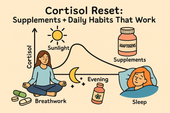
Cortisol Reset: Supplements + Daily Habits That Work
-
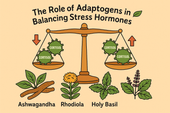
The Role of Adaptogens in Balancing Stress Hormones
Adaptogens work at the root of stress — your nervous system. 🌿 Learn how these powerful herbs help regulate cortisol, calm your nerves, and restore balance between energy and relaxation. ✨
-
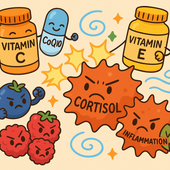
Antioxidants for Stress Management and Cortisol Control
When stress overwhelms your body, antioxidants come to the rescue. 🌿 Learn how vitamin C, CoQ10, and other natural compounds help reduce oxidative stress, regulate cortisol, and restore calm energy from within. ✨
-
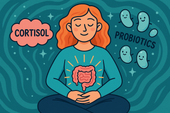
Cortisol and Gut Health: How Probiotics May Help
Chronic stress doesn’t just affect your mind — it changes your gut. 🌿 Learn how cortisol disrupts the microbiome and how probiotics can help restore balance, improve digestion, and calm your stress response naturally. ✨
-
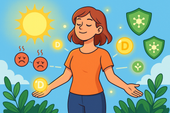
Vitamin D and Cortisol: Supporting Immune Balance
Vitamin D does more than strengthen bones — it helps regulate cortisol and support immune balance. 🌞 Learn how this essential hormone-like nutrient restores calm, improves mood, and strengthens your body’s natural stress defenses. 🌿
-
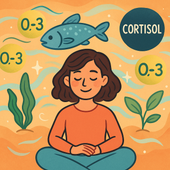
Omega-3s and Cortisol: Fighting Inflammation Naturally
Omega-3s are more than heart-healthy fats — they’re natural cortisol regulators. 🌿 Learn how EPA and DHA help reduce chronic inflammation, calm the nervous system, and support stress recovery from the inside out. ✨
-
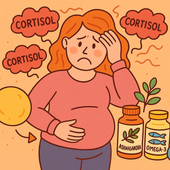
High Cortisol and Belly Fat: Can Supplements Help?
Chronic stress can make belly fat harder to lose — but supplements like ashwagandha, magnesium, and omega-3s may help restore cortisol balance. 🌿 Learn how science-backed nutrients support fat metabolism, calm your stress response, and bring your body back into harmony. ✨
-
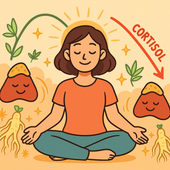
How Ginseng Can Support Energy and Cortisol Balance
Ginseng is one of nature’s most powerful adaptogens, helping your body handle stress without burning out. 🌿 Learn how this ancient root supports balanced cortisol, steady energy, and sharper focus — restoring vitality naturally and sustainably. ✨
-
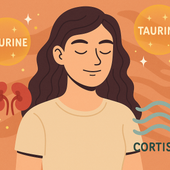
Taurine and Cortisol: Supporting Focus Under Stress
When cortisol surges, focus fades — but taurine helps restore balance. 🌿 Learn how this powerful amino acid calms your nervous system, regulates stress hormones, and sharpens concentration without jitters or fatigue. ✨
-
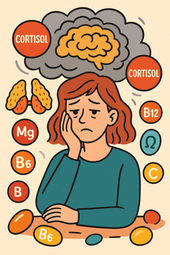
The Link Between Cortisol, Brain Fog, and Nutrient Deficiencies
When brain fog sets in, it’s not just in your head — it’s in your hormones. 🌿 Discover how cortisol imbalance and nutrient deficiencies like low magnesium, B vitamins, and omega-3s can cloud your focus and how restoring balance brings back mental clarity and calm. ✨
-
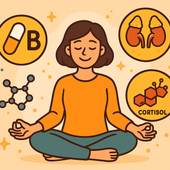
B Vitamins for Stress, Energy, and Cortisol Regulation
B vitamins are the foundation of stress resilience and steady energy. 🌿 Learn how this essential group of nutrients helps regulate cortisol, restore focus, and keep your nervous system calm — giving you balance from the inside out. ✨
-

Cortisol Imbalance and Chronic Fatigue: Can Supplements Help?
When chronic stress keeps cortisol high, fatigue and brain fog follow. 🌿 Learn how to rebalance your stress hormones naturally with calming nutrients, adaptogens, and lifestyle rituals that restore energy, focus, and inner peace. ✨
-

Adaptogen Stacks for Better Sleep and Lower Stress Hormones
Adaptogens can help your body recover from stress and sleep better by regulating key hormones like cortisol and adrenaline. 🌿 Learn how adaptogen stacks work to restore balance, calm the mind, and rebuild resilience — so you can rest deeply and wake renewed. ✨
-

Phosphatidylserine for Nighttime Cortisol Control
When stress hormones stay high at night, deep rest becomes impossible. 🌙 Discover how phosphatidylserine helps calm the brain, reduce nighttime cortisol, and restore healthy sleep rhythms — so you can wake up peaceful, clear, and recharged. ✨
-

Magnesium for Stress Relief and Cortisol Reduction
Magnesium is one of the most powerful natural tools for stress relief. 🌿 This essential mineral calms your nervous system, lowers cortisol, and helps your body recover from chronic tension. Learn how magnesium replenishes balance, improves sleep, and restores inner peace — naturally. ✨
-

Supplements to Improve Sleep by Balancing Cortisol
When cortisol stays high at night, sleep becomes a struggle. 🌙 Discover natural supplements that calm the nervous system, lower stress hormones, and restore your body’s natural rhythm. From magnesium and ashwagandha to L-theanine and phosphatidylserine, learn how to build deeper, more restorative rest. 🌿
-

Cortisol and Sleep: Why Stress Keeps You Awake
When stress keeps your body in fight-or-flight mode, cortisol refuses to calm down — and sleep becomes impossible. 🌙 Learn how elevated cortisol disrupts your circadian rhythm, suppresses melatonin, and turns restless nights into exhaustion. Discover how to restore balance and reclaim deep rest. ✨
-

L-Theanine for Cortisol Balance and Anxiety Relief
L-Theanine — the calming amino acid from green tea — helps quiet the mind and balance cortisol, the body’s key stress hormone. 🌿 Learn how it promotes calm focus, eases anxiety, and supports deep rest without sedation, backed by modern research and centuries of tradition. ✨
-

Rhodiola Rosea and Stress Resilience: A Natural Cortisol Regulator
Rhodiola rosea is one of nature’s most powerful tools for resilience. 🌿 This Arctic root helps balance cortisol, fight fatigue, and sharpen focus — keeping you calm yet energized even under stress. Discover the science behind Rhodiola’s adaptogenic power and how it helps your body thrive under pressure. ✨
-

Ashwagandha for Cortisol Balance: What the Science Says
Ashwagandha helps your body recover from chronic stress by calming the adrenal system and balancing cortisol — your key stress hormone. 🌿 Learn what science says about this powerful adaptogen, how it restores energy and focus, and why it’s one of nature’s most effective tools for modern stress relief. ✨
-

Supplements That Naturally Lower Cortisol Levels
When cortisol levels calm, your energy transforms — no more crashes or jitters, just steady focus and inner peace. 🌿 Learn which natural supplements and habits lower stress hormones, boost calm energy, and help your body thrive with balance instead of burnout. ✨
-

What Is Cortisol Imbalance? Symptoms You Shouldn’t Ignore
Cortisol — your body’s main stress hormone — keeps you alert and energized, but when it’s out of balance, it can drain your health. 🌿 Learn the signs of cortisol imbalance, from fatigue and anxiety to sleep disruption and stubborn weight gain, and discover how to restore calm, energy, and hormonal harmony naturally. ✨
-

The Best Daily Multivitamins for Menopausal Women
Menopause brings new nutritional needs that your old vitamin routine may no longer meet. 🌿 Discover how the right daily multivitamin can boost energy, balance mood, support bone and heart health, and keep your skin glowing. Learn which nutrients truly matter — from vitamin D to magnesium and B12 — to feel strong and vibrant every day. ✨
-

Antioxidants and Menopause: Fighting Inflammation Naturally
During menopause, oxidative stress and inflammation can quietly accelerate aging, fatigue, and skin changes. 🌿 Learn how antioxidants — from vitamins C and E to polyphenols in berries and green tea — help neutralize free radicals, reduce inflammation, and restore balance naturally. Discover the science of radiant, resilient aging. ✨
-

How CoQ10 Supports Heart Health After Menopause
After menopause, heart health becomes more important than ever. ❤️ Discover how CoQ10 — your body’s natural energy molecule — supports cardiovascular strength, restores vitality, and protects against oxidative stress. Learn how this essential nutrient helps keep your heart energized, balanced, and resilient through every stage of life. 🌿
-

Collagen Supplements for Skin and Joint Health Post-Menopause
After menopause, collagen loss affects both skin elasticity and joint comfort — but supplements can help rebuild from within. 🌸 Learn how collagen peptides, vitamin C, and other nutrients work together to restore firmness, reduce stiffness, and keep you glowing and mobile well into your next chapter. ✨
-

Calcium and Vitamin D: Protecting Bone Health in Menopause
Menopause brings hormonal changes that can weaken bones—but with the right nutrients, strength and stability can be rebuilt. 🦴 Learn how calcium and vitamin D work together to protect bone density, prevent fractures, and keep your body resilient. This guide explores nutrition, sunlight, and lifestyle habits that help your bones stay strong and vibrant for years to come. ☀️💪
-

Adaptogens for Energy and Resilience During Menopause
Feeling drained or emotionally scattered during menopause? 🌿 Discover how adaptogenic herbs like Ashwagandha, Rhodiola, and Ginseng can restore energy, balance cortisol, and build emotional resilience. Learn how these natural allies work with your body—not against it—to help you stay strong, focused, and calm through life’s hormonal changes. 🌸
-

Supplements That Help Beat Menopause Fatigue
Menopause fatigue can feel like more than tiredness—it’s a total energy crash. This guide explores how specific supplements, mindful breathwork, and therapy can help restore balance. Learn how nutrients like B vitamins, magnesium, and adaptogens rebuild your stamina, while breathwork and emotional healing calm your nervous system and bring vitality back to your days. 🌿✨
-

Herbal Blends for Menopausal Restlessness: Finding Calm in Transition
Herbal blends bring the wisdom of nature into moments of rest and renewal. Discover how soothing herbs like chamomile, lemon balm, and ashwagandha work together to calm menopausal restlessness, balance hormones, and invite deep relaxation. 🌿💫
-

Magnesium + Glycine for Deep Sleep During Menopause
Nutrients like magnesium, glycine, and B vitamins form the foundation for deep, restorative sleep during menopause. Discover how these natural compounds calm your nervous system, balance hormones, and help you wake up refreshed and recharged. 🌿💤
-

Melatonin and Menopause: Restoring Your Sleep Cycle
Nutrients are the foundation of hormone balance and energy. Learn how vitamins, minerals, and whole foods like greens, salmon, and berries nourish women’s bodies during menopause and beyond — restoring vitality, mood, and strength. 🌿🥗
-

How L-Theanine Helps With Menopausal Anxiety
Science continually deepens our understanding of the human body, from hormones to neurotransmitters. Discover how evidence-based research shapes modern wellness — bridging natural medicine, neuroscience, and hormone balance for healthier living. 🔬🌿
-

Can Ginkgo Biloba Improve Memory in Menopausal Women?
Hormone therapy can be a powerful tool for easing menopause symptoms and restoring balance. Learn how it works, the types available, and how to combine it safely with lifestyle and natural support for optimal well-being. 🌸💊
-

B Vitamins for Mental Clarity During Menopause
Nutrients are the foundation of mental and physical balance during menopause. Discover how vitamins, minerals, and whole foods like leafy greens, fish, nuts, and citrus can fuel energy, clarity, and calm while supporting hormonal health. 🌿✨
-

Mood Swings and Menopause: Natural Nutrient Support
Probiotics do more than support digestion — they help balance mood, hormones, and immunity too. Learn how a healthy gut microbiome can ease menopause symptoms, boost energy, and improve emotional resilience naturally. 🌿🦠
-

Brain Fog in Menopause: Supplements That May Help
Supplements can be powerful allies in restoring balance, energy, and focus—especially during menopause. Learn how nutrients like omega-3s, vitamin D, magnesium, and herbal adaptogens work together to support brain health, reduce stress, and promote lasting vitality. 🌿💊
-

Adaptogen Stacks for Reducing Night Sweats
Hormone detox isn’t about cleansing your body—it’s about restoring flow. Learn how the liver, gut, and endocrine systems work together to eliminate hormone buildup and how herbs like milk thistle, dandelion, and schisandra support balance, clarity, and natural vitality. 🌿💫
-

Cooling Menopause Symptoms with Herbal Support
Ashwagandha is one of nature’s most powerful adaptogens, helping women manage stress, sleep better, and balance hormones naturally. Discover how this ancient root supports calm energy, emotional resilience, and relief from menopause-related anxiety and fatigue. 🌿💫
-

Evening Primrose Oil and Menopause: What the Research Says
Hot flashes are one of the most common—and frustrating—symptoms of menopause. Discover what causes them, why the body’s “internal thermostat” becomes unbalanced, and the natural supplements and lifestyle shifts that can help you cool down, rest better, and feel more in control. 🔥💧
-

How Black Cohosh Helps with Menopausal Symptoms
Sleep disturbances are among the most exhausting symptoms of menopause—but they don’t have to rule your nights. Discover how natural strategies and calming supplements can help you fall asleep faster, stay asleep longer, and wake up feeling truly restored. 🌙💤
-

Natural Supplements That May Reduce Hot Flashes
Hot flashes can disrupt sleep, confidence, and daily comfort—but natural relief is possible. Discover the best research-backed supplements like black cohosh, red clover, and licorice root that may reduce hot flashes, balance hormones, and restore inner calm during menopause. 🌿💫
-

Omega-3s and Menopause: Supporting Mood and Inflammation
Omega-3 fatty acids are essential for hormonal harmony, brain function, and emotional balance—especially during menopause. Learn how these healthy fats reduce inflammation, support heart health, and restore calm, vitality, and focus through every stage of midlife. 🌊💫
-

The Role of Vitamin D in Menopausal Health
Vitamin D plays a powerful role in menopausal health—supporting bone strength, hormone balance, and mood stability. Discover how optimizing your vitamin D levels can improve sleep, energy, and emotional well-being while protecting long-term vitality through every stage of menopause. 🌞💪
-

Magnesium for Menopause: Relaxation, Sleep, and Hormonal Support
Self-regulation is the art of staying calm, centered, and in control—no matter what life throws your way. Learn how to strengthen emotional balance, manage stress responses, and cultivate inner peace through mindful techniques that reconnect your heart, body, and brain. 🌿💫
-

Can Adaptogens Like Ashwagandha Ease Menopausal Symptoms?
Brain fog during menopause can make even simple tasks feel overwhelming—but you’re not losing your sharpness, your hormones are simply shifting. Discover how adaptogens like ashwagandha and key nutrients can restore mental clarity, balance cortisol, and bring calm focus back to your day. 🌿🧠
-

Supplements That Support Hormonal Balance During Menopause
Herbal supplements have supported women’s health for centuries—and modern science is finally catching up. From ashwagandha and maca to red clover and rhodiola, discover how nature’s most trusted herbs can calm stress, balance hormones, and enhance energy through every life stage. 🌿✨
-

The Ultimate Motivation Stack: Supplements That Work Together
Discover how therapy helps restore motivation, focus, and emotional balance alongside supplement and mindset strategies. This empowering article explores how addressing thought patterns and emotional blocks through therapy can complement biochemical tools for long-term drive and well-being. 🧠💬
-

Entrepreneurial Drive: Can Supplements Help You Avoid Burnout?
Entrepreneurship demands energy, creativity, and mental resilience—but without balance, it leads to burnout. This in-depth article explores how nootropic supplements, adaptogens, and mindset tools can help entrepreneurs sustain motivation, manage stress, and keep their drive sharp for the long haul. 🚀💼

















































